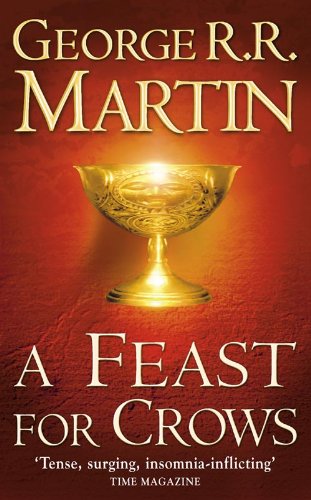A Week of Ice and Fire, Day Four!

Ah, here is where it all ended six years ago. And this is only half the story – George R.R. Martin chose to split this book geographically, with only the southrons getting any attention in this volume. For news of those in the north and the east, we have to wait until A Dance With Dragons. This means two things: A Feast For Crows and A Dance With Dragons are both sequels to A Storm of Swords, and we won't get a follow up on the events of A Feast For Crows until The Winds of Winter is published … whenever that may be.
This isn't all bad, because A Feast For Crows is a pretty dang good book. Yet, even more than A Feast For Crows, Martin has truly cultivated his taste for insane cliffhangers. I understand now why people have been so upset for the last six years (particularly as this volume has Martin "devoutly hoping†to release A Dance With Dragons within a year – signed June 2005), but … they're not going to get any answers. Nothing but questions await us next week, but I don't plan on devoting my life to cursing Martin's name for taking his own sweet time.
Contains the risk of spoilers for the three books that came before it!
Cersei is the only Lannister left in King's Landing and decides that she's finally going to use her powers as regent to rule the Seven Kingdoms, while trying to consolidate her power and hold back the Tyrells. Brienne travels in search of Sansa, who is safely ensconced in the Eyrie. In Dorne, the Martell family has different ideas about how to deal with Princess Myrcella. On the Iron Islands, the Greyjoys hold a Kingsmoot so that they can appoint a new leader. Samwell takes to the sea so that he may train as a Maester in Oldtown, while Arya becomes a novice in the House of Black and White.
A Feast For Crows immediately comes across as stylistically different to the rest of A Song of Ice and Fire. In the prologue we are introduced to an entirely new scenario: the maesters-in-training of Oldtown, and the amount of world building involved in these few short pages is admirable. I was surprised when the info actually paid off within the book, because just getting the sense of place was satisfying enough to my eyes. It's vastly different to anything that Martin has presented before in the series, but it works.
In lieu of Daenery's antics, this time around we have a variety of characters from the Iron Islands trying to ensure that the right person becomes the King of the Iron Islands and, in time, the Seven Kingdoms. Rather than focusing on any single Greyjoy, we get the story told across several characters' viewpoints. This is an effective way to get the mentality of the Iron Islands across in more detail than Theon managed in A Clash of Kings. These are people who alternately subscribe to the orthodoxy of the driftwood crown, defy it and subvert it. It it A Feast For Crows' own separate novella and … to be honest it kind of fizzles out; his is symptomatic of never knowing exactly when a plot thread's involvement is going to end in any given novel of this series. But what there is is very interesting and it does promise a return on investment in future volumes.
The Dornish chapters are similarly set-up for a future volume, yet they are exciting regardless. The Martell family have been severely underrepresented so far, and to get this much of them all at once and to understand their motivations is a gift of sorts. I suspect that a whole series could have been written focusing on the enmity between Houses Martell and the Tyrell, but of course they blend seamlessly into the larger story begun by the Targaryens however many years before. I look forward to their chapters in future volumes, so at least it can be said of Martin that he leaves you wanting more.
The main attraction here is the inclusion of a new POV character: Cersei herself. Martin has finally allowed us into the head of his most potentially evil character. Joffrey had the thoughtless malice of youth, but Cersei is powered by ambition and venom. I don't know why I was so surprised, but a lot of her internal monologue is devoted to her wishing that people were dead. She schemes, but she doesn't govern. The Summer of the Lannisters is coming to an end as we realise that perhaps Cersei has no sense in her head. Unlike Jaime, it's very difficult to sympathise with someone so obviously sociopathic. She's a very clinically minded character, to whom sex is a weapon and from whose wrath no one is safe. There is a sense of schadenfreude in realising just how bad she is at the job that she fought to secure over the last three books, but everything that she does bodes ill for practically everyone in the world.
The other new POV character, Brienne, works as a perfect complement to Jaime. They have imprinted on each other in a way that I like, supplanting their previous allegiances in a natural way without pandering. I can only hope that Martin never succumbs to the demands of internet fandom, but as he writes on a DOS-based computer I think the outlook is fairly good.
Martin has changed the tone of his plotting, ending chapters on good notes and saving the cliffhangers for the bitter, bitter end. It's impossible to tell when each character's end will fall until you've reached the last page, and if you're anything like me you'll find yourself backtracking to reassess their final appearance. Here more than ever, Martin asserts himself as an absolute sadist. But he does it for love … love of what I'm not precisely sure, but as long as the outcome that I want for this series remains a possibility I'm not complaining.
Having read all of the books to date, I would say that A Storm of Swords is likely my favourite, but A Feast For Crows is really good as a book telling half of an extremely large and intertwining story. It feels different to the rest of them, but this managed to keep my journey of the last couple of months fresh. These books are addictive and unforgiving, and they now sit high in my own personal pantheon.


